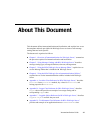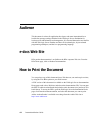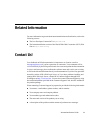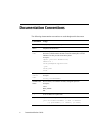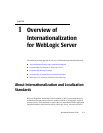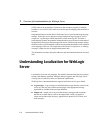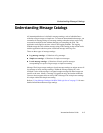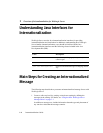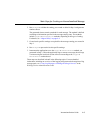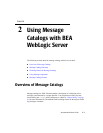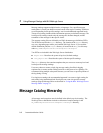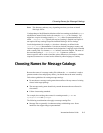
1 Overview of Internationalization for WebLogic Server
1-2 Internationalization Guide
(I18N) refers to the preparation of software so that it behaves properly in multiple
locations. Localization (L10N) is the use of locale-specific language and constructs at
run time.
Internationalization of textual data in WebLogic Server is provided through message
catalogs. WebLogic Server supports message catalogs for log messages as well as
simple text. Log messages contain data that is written to the log file. This data is
predominantly dynamic and contains information that is specific to the current state of
the application and system. When merged with text in a localized log message catalog,
this data results in well-formatted, localized messages that describe the error condition
in the language of the user. The output sent to the console is simple text. As with log
messages, simple text can be merged with dynamic data.
The information covered in this guide addresses only the internationalization of textual
data.
Understanding Localization for WebLogic
Server
Localization covers not only language, but collation, date and time formats, monetary
formats, and character encoding. Messages that are logged to the WebLogic Server
error log can be localized to meet your particular requirements.
WebLogic Server internationalization supports localization of two types of data:
Log messages—Log messages are informational messages that are written to the
server log, and may also contain error messages if the appropriate message
arguments are included in the message definition.
Simple text—Simple text is any text other than log messages and exceptions
that the server must display, such as the output from a utility. Examples of
simple text include usage messages, graphical user interface (GUI) labels, and
error messages.




